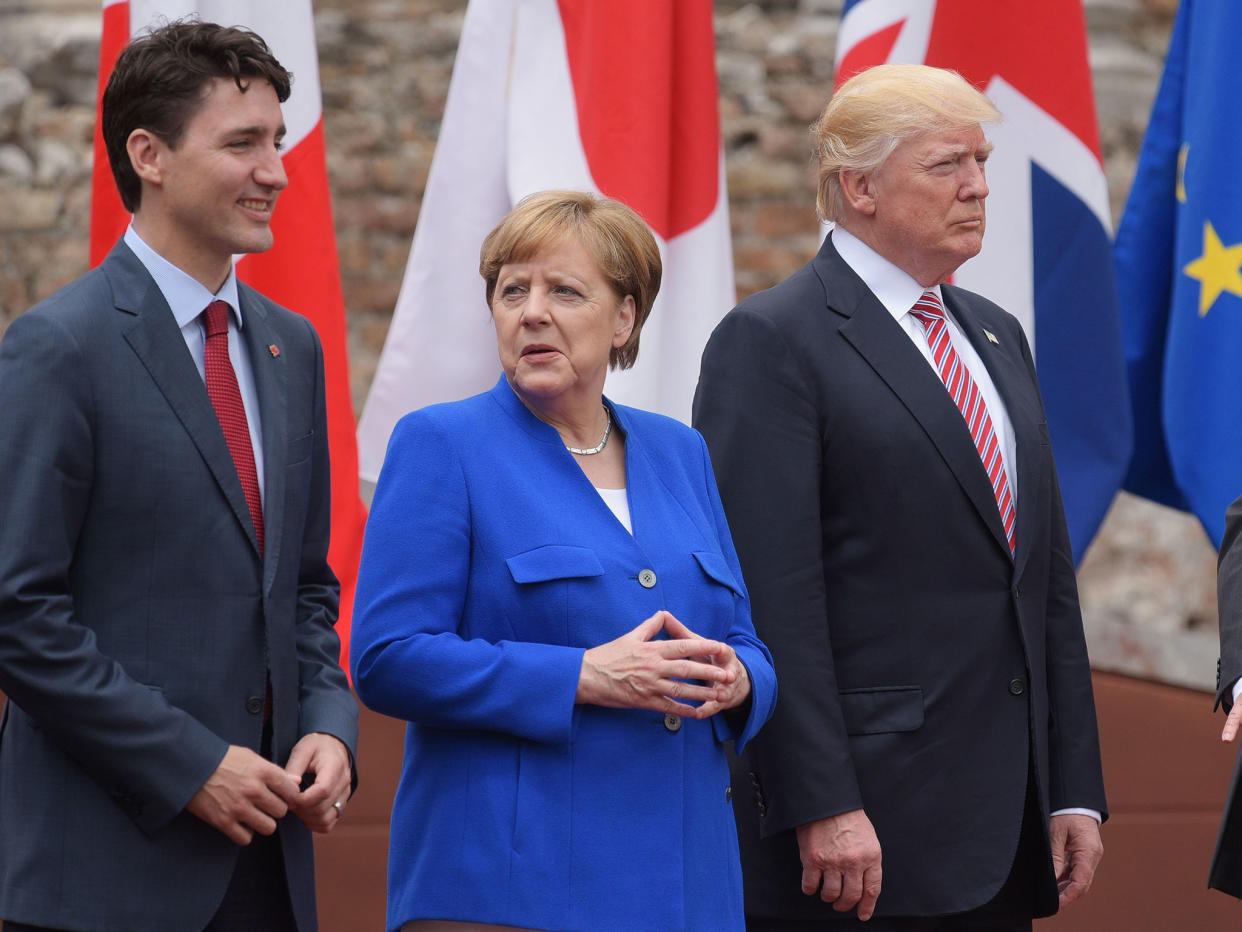Donald Trump's obsession with money means he can never live up to his predecessor

A giant of an American political figure visiting Europe: charismatic and charming with a thorough grasp of international affairs, totally relaxed with the huge crowd around him. That was former President Barack Obama in Berlin on Thursday alongside Angela Merkel.
At the same time, 435 miles down the road in Brussels, was his successor in the White House, Donald Trump on his first Nato summit: surly, truculent, ill at ease and looking rather odd, with American diplomats around him looking somewhat embarrassed.
Mr Trump had been fawning to Arab Royalty in Riyadh as he sold $110bn in arms to Saudi Arabia and openly asked the Sheikhs of Kuwait and Qatar to buy more American weapons. He was still talking money in Brussels, demanding that the US’s democratic allies pay more for defence.
The American President was still talking money over relations with Germany. He was overheard saying “the Germans are bad, very bad”. How did this badness manifest itself? “Look at the millions of cars they sell in the US and we’ll put a stop to that,” said Mr Trump, railing about the trade imbalance between the two countries.
And Mr Trump was still talking money in his talk on the geopolitical importance of Western Europe with the Belgian prime minister Charles Michel. Ireland? It took him two and half years to get a licence to do business and that gave him a bad idea of the EU as a whole. Scotland? He talked about opening a golf club and how much it cost. Belgium? He liked the chocolates he was given and talked about how much it may cost to manufacture them.
Later, during the photocall for the Nato heads of state, Mr Trump pushed his way to the front and postured, shoving aside Dusko Markovic, the Prime Minister of Montenegro, the latest Nato member. The President ignored a request by the Canadian Prime Minister Justin Trudeau to the heads of state to wave to the camera, staring straight ahead.
Mr Trump’s speech to the Nato leaders was on the familiar theme of many member states not paying their dues. But the US President did not appear to understand the difference between rules and recommendations.
“This is not fair to the people and taxpayers of the United States and many of these nations owe massive amounts of money from past years and [from] not paying in those past years,” Mr Trump said.
But the 2 per cent target is only a guideline and there is no penalty for not meeting it; the rest of Nato do not “owe” anything to the US, a point Mr Trump seemed not to grasp. Some of the leaders looked sideways at each other as he spoke.
Relations with Russia remain a thorny point after Mr Trump’s public statements of admiration for Vladimir Putin, seeming acceptance of the annexation of Crimea by Russia and now official investigations into his campaign team’s links with the Kremlin.
The US President said: “The Nato of the future must include a great focus on terrorism and immigration, as well as on threats from Russia and on Nato’s eastern and southern borders.” However, European Council President Donald Tusk said: “I’m not 100 per cent sure we can say that we have a common position on Russia, although when it comes to the conflict on Ukraine we were on the same line.”
Unlike every American president before him, Mr Trump did not pledge to uphold Article Five, Nato’s commitment to mutual defence in the event of an attack on a member. The US had invoked Article Five after the 9/11 attacks. There have been repeated charges, including by Mr Trump himself in the past, that Saudi Arabia may have played a part in the atrocity, something he had not mentioned, of course, while selling arms to the Saudis on this trip. It was left to an unnamed White House official to tell a news agency that the President was committed to Nato defence.
Terrorism, however, gave the President an opportunity to castigate those investigating him in the US over his Moscow links. Theresa May had complained about leaks of information about the Manchester attacks by US security agencies to the media. Mr Trump, who had been leaked against over the Russia inquiry, said he was going to order an investigation. “These leaks have been going on for a long time,” he wanted to point out.
Mr Trump travelled on Friday to the G7 meeting in Sicily where some of the same Nato leaders were also present, and where there would be tough talks on issues such as trade and climate change. But some of the apprehension about Mr Trump which came immediately after he became President has dissipated somewhat. His constant U-turns and contradictory statements may be confusing, but are no longer necessarily seen as alarming. There is also now the possibility that he may not serve out his full term. It is no longer improbable to think that impeachment may come over the Russia inquiry.
After their public appearances, most of the senior Nato leaders spoke to each other, but few approached Mr Trump. Barack Obama used to be always surrounded by the other heads of state at international summits, trying to catch his eye, vying to have a word with the most powerful man on earth.

